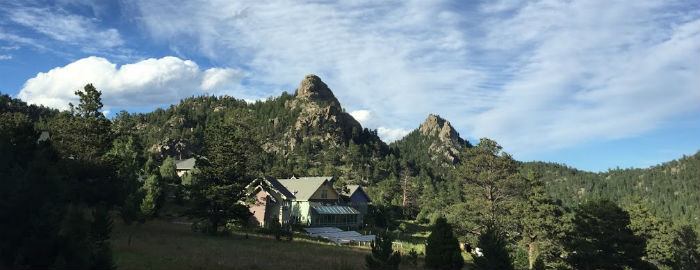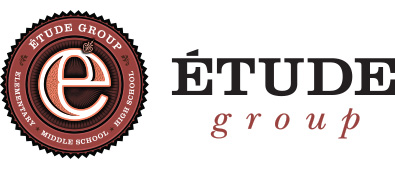
Every school has its own outlook and approach to connect with its students. Eagle Rock School, located in Estes Park, Colorado, is a year-round, residential school for students who, according to its website, “are not thriving in their current situations, for whom few positive options exist and who are interested in taking control of their lives and learning.”
However, Eagle Rock School holds more similarities to The Étude Group than initially meet the eye. Both schools follow similar philosophies and practices, and TEG teachers Beckah DeYoung and Kim Johnson ventured to Estes Park to learn about what exploring these similarities and differences could lead to.
Eagle Rock’s Professional Development Center hosts teachers from all over the nation to discuss their personal teaching goals and dilemmas and to learn from Eagle Rock’s students.
Throughout their stays, DeYoung and Johnson were able to talk directly with Eagle Rock students and hear about their personal experiences. “These kids are used to having people come through their schools, but everyone was still so open to conversations, and they were honest,” DeYoung said. “I could sit down with any student and have a conversation about what they’re doing... and they were open and honest about all of it. That was refreshing.”
Like The Étude Group, Eagle Rock is based on principles of individual integrity and a strong sense of community. An integral part of creating this atmosphere at Eagle Rock comes from a 24-day wilderness experience that all students are required to participate in upon admission.
“I talked to a lot of [students] about their wilderness experiences,” DeYoung said. “Just hearing about how incredibly eye-opening that was for them and how much they learned was really powerful.”
“Being in a situation in which you have to survive, you have to figure out who you are and fend for yourself,” DeYoung said. “It shows you who are and helps you develop yourself. You know yourself on a completely different level.”
Johnson noted another important similarity between Eagle Rock and The Étude Group: that each faculty member plays many roles within the school community.
“I learned that recognizing you can’t do everything all at the same time, but allowing your relationships to prioritize those roles is important,” Johnson said. “I noticed that the teachers there could recognize success in each of their roles, but they also could find specific things they were working on in each role... Adults are valued as learners too.”
DeYoung and Johnson were able to attend student organization meetings and spend time in the school during class time. “We saw students presenting what they’re learning to the whole school,” DeYoung said. “They shared out what they were working on. That was empowering for the students to get feedback from their peers and others that don’t know what’s going on in their classes and be able to explain it to them well enough that they can give feedback.”
DeYoung also said that, like The Étude Group, Eagle Rock structures its classes around students’ interests. “The way that they designed their classes around student voice was really intriguing,” she said. “The more student voice we have in the classroom, the more engagement we have. If they’re answering their own questions, they’ll continue to pursue it and learn more.”
Not only were they able to interact with Eagle Rock students and faculty, but they also were able to talk with other professionals visiting Eagle Rock from around the nation. “We could see that, even though we’re just a small school in Sheboygan, our practices are effective and might be useful to other schools,” Johnson said. “It makes me question, how could we be helping other schools more?”
DeYoung agreed that discussing dilemmas with other schools was “really valuable because not only were we receiving help from other schools, but we were able to give advice to other schools and help them. That atmosphere of collegiality was something that I would like to see continue to be fostered within our schools in terms of student work.”
“Just interacting with an organization that’s not mainstream helped me understand the process of change and adaptation,” Johnson said. “Sometimes it can be very slow and sometimes it’s immediate, but a really strong professional culture can make those things possible.”

